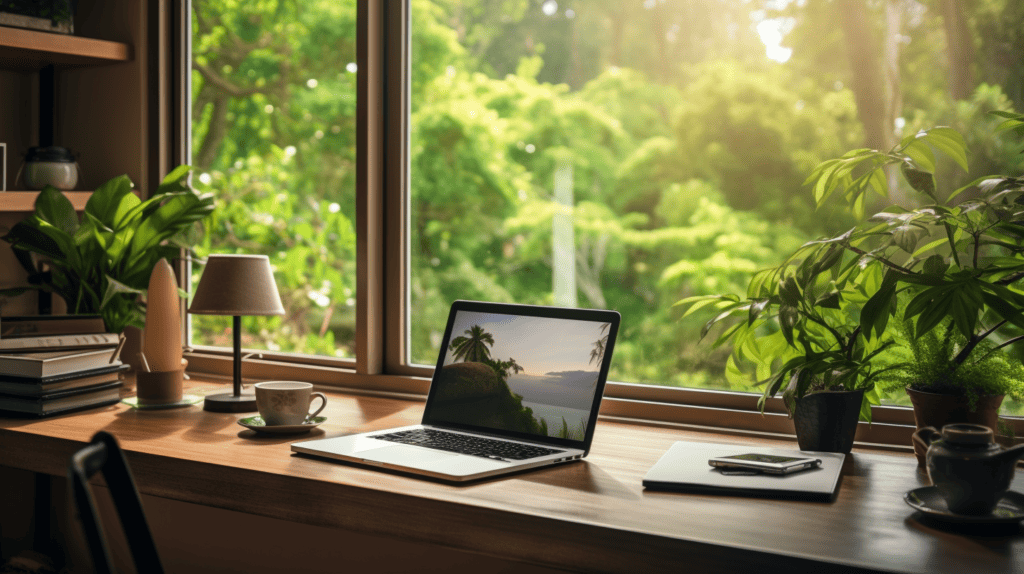As a professional, I know how challenging it can be to schedule free time. Between meetings, deadlines, and projects, it’s easy for free time to slip away. However, I also know firsthand the importance of scheduling free time to achieve work-life balance. Not only does efficient time management lead to increased productivity, but it also leads to improved happiness and overall well-being.
Key Takeaways:
- Scheduling free time is crucial for achieving work-life balance.
- Efficient time management can lead to increased happiness and overall well-being.
The Impact of Time Management on Work-Life Balance
As someone who values work-life balance, I can attest to the profound impact that effective time management can have on achieving that balance. When I prioritize my time effectively, I find that I have more space in my schedule for personal activities and hobbies, which in turn improves my overall well-being and happiness.
Research has shown that individuals who are able to manage their time effectively experience less stress and are better able to maintain a healthy work-life equilibrium. By scheduling and organizing our time, we are better equipped to prioritize our personal lives, which in turn leads to increased satisfaction and fulfillment.
The Importance of Time Management for Work-Life Balance
Effective time management is essential for achieving work-life balance. When we are able to manage our time effectively, we are better able to set aside dedicated time for personal activities and hobbies. This leads to reduced stress and improved overall well-being.
Additionally, effective time management helps us to prioritize our personal lives, which is essential for maintaining a healthy work-life balance. When we have more control over how we spend our time, we are better able to maintain meaningful relationships, pursue our passions, and find fulfillment outside of work.
In short, effective time management plays a critical role in achieving work-life balance. By prioritizing our time and organizing our schedules, we are better able to prioritize our personal lives and find fulfillment and happiness outside of work.
Strategies for Effective Time Scheduling
Now that I understand the importance of scheduling my free time, I need to master the art of time scheduling. Here are some strategies that I find useful:
- Create a schedule: I have found that making a schedule for my free time helps me stay on track. I use a planner or calendar to fill in my commitments and activities, leaving room for relaxation and hobbies.
- Use time-blocking techniques: Time blocking involves dedicating specific time slots to certain activities. For example, I might block off an hour for exercise or thirty minutes for reading a book. This technique helps me stay focused and avoid distractions.
- Set aside dedicated time for personal activities and hobbies: Just as I schedule work or appointments, I also make sure to block off time for personal activities and hobbies. This is my time to recharge and do things I enjoy, whether it be practicing a musical instrument or gardening in my backyard.
By following these strategies, I can effectively manage my free time and ensure that I prioritize self-care and personal fulfillment.

Maximizing Free Time for Personal Wellness
When it comes to using free time, I think it’s important to prioritize personal wellness. After all, taking care of ourselves can improve our mood, energy levels, and overall quality of life. Here are some ways I like to make the most of my free time for my own well-being:
- Exercise: Whether it’s hitting the gym, going for a run, or taking a yoga class, I try to incorporate some physical activity into my free time. Not only does it improve my physical health, but it also boosts my mental health and helps me relieve stress.
- Meditation: Sometimes, I just need to quiet my mind and take a break from the chaos of daily life. That’s where meditation comes in. Even just 10 minutes a day can make a big difference in my mental clarity and overall well-being.
- Pursuing hobbies: I think it’s important to have interests and hobbies outside of work and responsibilities. For me, that might mean painting, playing an instrument, or reading a good book. Whatever it is, I try to make time for it regularly.
Of course, everyone’s idea of personal wellness may be different. The key is to find what works for you and make it a priority in your free time. Self-care isn’t selfish; it’s necessary for our health and happiness.
Allocating Time for Relationships and Socializing
Spending quality time with loved ones and friends is an essential part of achieving work-life balance. However, in today’s hectic world, it’s easy to get caught up in work and neglect personal relationships. That’s why it’s important to allocate time for socializing and connecting with others.
Studies have shown that maintaining healthy social connections can improve mental health, reduce stress, and even increase lifespan. So, prioritize spending time with the people who matter most to you.
Here are some tips on how to allocate time for relationships and socializing:
- Schedule regular date nights with your partner or significant other, and stick to them as much as possible.
- Plan outings with friends, such as brunches, hikes, or game nights, in advance so that you have something to look forward to.
- Attend events or join clubs that align with your interests to meet new people and expand your social circle.
- Practice active listening and be fully present during conversations, putting away distractions such as phones or laptops.
Remember, it’s not just about the quantity of time spent socializing, but the quality of the interactions. Invest in your relationships and watch as they contribute to your overall happiness and well-being.

Strategies for Balancing Work and Personal Life
One of the biggest challenges in achieving work-life balance is finding ways to balance the demands of our professional and personal lives. As someone who has struggled with this myself, I have found a few strategies that have helped me achieve a greater sense of harmony between work and personal life.
Set Boundaries
One of the most important strategies for balancing work and personal life is setting boundaries. This means establishing clear limits on when you will work and when you will engage in personal activities. For example, you might decide that you will not check email after 7 pm or that you will not bring work home on the weekends. By setting these boundaries, you create space for personal activities and reduce the risk of burnout.
Delegate Tasks
Another way to balance work and personal life is by delegating tasks. This means asking for help when you need it and outsourcing tasks that are not a good use of your time. For example, you might hire a cleaning service to help with housework or delegate some of your work tasks to a colleague or assistant. By delegating tasks, you free up time for other activities and reduce the risk of overwork.
Disconnect from Work
It’s also important to find ways to disconnect from work during your personal time. This might mean turning off your phone or email notifications when you’re not working or engaging in activities that do not require technology. By disconnecting from work, you create space for personal activities and reduce the risk of burnout.
Take Breaks
Finally, taking breaks is an important strategy for balancing work and personal life. This means stepping away from work regularly and engaging in activities that recharge your batteries. For example, you might take a walk during your lunch break or spend time with friends or family. By taking breaks, you increase your productivity and reduce the risk of burnout.
Overall, balancing work and personal life is a complex and ongoing process. By setting boundaries, delegating tasks, disconnecting from work, and taking breaks, however, you can achieve a greater sense of harmony between your professional and personal lives.
Overcoming Procrastination and Time Wasters
One of the biggest hurdles to effective time management and work-life balance is procrastination. It’s easy to get sidetracked by social media, email, or other distractions, ultimately wasting valuable time that could be spent on personal fulfillment. Fortunately, there are several strategies you can use to overcome procrastination and increase productivity.
First and foremost, eliminate distractions. Try turning off notifications on your phone or computer while working on personal projects, and designate specific times of the day to check email or social media. This not only minimizes distractions but also helps you stay focused and on-task.
Another useful technique is breaking tasks down into smaller, manageable steps. This makes the project feel less daunting and helps you avoid becoming overwhelmed. Additionally, using a timer can help keep you on track and ensure you’re making the most of your time. Try working in focused 25-minute bursts followed by short breaks – this method, known as the Pomodoro technique, can be highly effective.
Remember, procrastination is often a symptom of feeling overwhelmed or unsure of where to start. If you’re struggling with a particular task, don’t be afraid to ask for help or advice. Chances are, there are resources available to assist you in getting started and overcoming procrastination.
“You may delay, but time will not.” – Benjamin Franklin

The Role of Technology in Free Time Management
Technology has revolutionized the way we manage our time, making it easier and more efficient to schedule free time. There are a plethora of apps, tools, and techniques available to help you optimize your schedule and make the most of your personal time. Here are some ways technology can aid in free time scheduling and time management:
- Calendar apps: These apps allow you to schedule appointments, events, and reminders in one place. You can set notifications to remind you of important events and even sync your calendar with other devices.
- Task management apps: These apps help you prioritize your tasks and track your progress. You can create to-do lists, set deadlines, and even delegate tasks to others.
- Time tracking apps: These apps help you monitor how you spend your time, identifying areas where you can be more efficient. You can set goals, track your progress, and even view reports to analyze your productivity.
- Distraction-blocker apps: These apps can help you stay focused and avoid distractions while you work. You can block social media sites, set timers, and even track the amount of time you spend on different tasks.
While technology can be a valuable tool for free time management, it’s important to use it wisely. Don’t rely too heavily on technology and remember to take breaks from screens to avoid burnout.
Finding Work-Life Balance in a 24/7 World
As someone who values work-life balance, I understand the challenges of achieving it in today’s fast-paced, always-connected world. With emails pinging at all hours and the pressure to be constantly productive, it can be tough to find time for personal activities and self-care. However, prioritizing work-life balance is crucial for maintaining overall well-being and happiness.
One strategy for finding work-life balance in a 24/7 world is to set clear boundaries. This may mean turning off notifications on weekends, avoiding checking emails before bed, or designating specific hours for work tasks versus personal activities. By creating and enforcing these boundaries, we can protect our free time and prevent work from encroaching on our personal lives.
Another important factor in achieving work-life balance is managing expectations. It’s easy to fall into the trap of thinking we must always be available and responsive to work demands. However, setting realistic expectations with colleagues and clients about response times and availability can help reduce stress and prevent burnout.
Finally, prioritizing self-care is essential for finding work-life balance. This means making time for rest, relaxation, exercise, and hobbies. When work and personal lives start to blend together, it can be helpful to schedule in these activities just as we would schedule in work tasks. By prioritizing self-care, we can boost our productivity and overall well-being.
Conclusion on Schedule Free Time
As I wrap up this article on work-life balance and efficient time management, I want to emphasize the importance of prioritizing free time and personal wellness. It’s easy to get caught up in work and responsibilities, but neglecting our own well-being can lead to burnout and unhappiness.
By scheduling free time and using effective time management strategies, we can achieve a healthy work-life balance that allows us to prioritize both our personal and professional lives. This includes allocating time for relationships and socializing, maximizing free time for personal wellness, and overcoming common time wasters like procrastination.
Technology can also aid in free time scheduling and time management, with a wealth of useful apps and tools available to streamline our schedules and boost productivity.
Takeaways
Here are some key takeaways to keep in mind:
- Schedule free time to achieve work-life balance and increase happiness
- Effective time management can reduce stress and promote well-being
- Strategies like setting boundaries, delegating tasks, and disconnecting from work can help maintain balance
- Self-care activities like exercise, meditation, and pursuing hobbies are crucial for personal wellness
- Allocating time for relationships and socializing is important for maintaining healthy connections
- Overcoming procrastination and time wasters can lead to more productive and fulfilling free time
- Technology can aid in scheduling and productivity, but should be used mindfully
I hope these tips and strategies help you improve your work-life balance and make the most of your free time. Remember to prioritize your well-being and happiness, and don’t forget to schedule some time just for you!
FAQ on Schedule Free Time
Q: Why is scheduling free time important for achieving work-life balance?
A: Scheduling free time allows individuals to prioritize their personal lives and reduce stress, leading to a healthier work-life equilibrium.
Q: What are some strategies for effective time scheduling?
A: Creating a schedule, using time blocking techniques, and setting aside dedicated time for personal activities and hobbies can help optimize free time.
Q: How can I maximize free time for personal wellness?
A: Incorporating self-care activities, such as exercise, meditation, and pursuing hobbies, into a busy schedule can help optimize free time for personal wellness.
Q: How do I allocate time for relationships and socializing?
A: Prioritizing quality time with loved ones and friends is important for maintaining healthy social connections. Tips for time allocation will be provided.
Q: What are some strategies for balancing work and personal life?
A: Setting boundaries, delegating tasks, and finding ways to disconnect from work during personal time can help achieve a better work-life balance.
Q: How can I overcome procrastination and time wasters?
A: Practical tips for overcoming procrastination, boosting productivity, and reclaiming more time for personal activities will be shared.
Q: How can technology aid in free time management?
A: Technology offers useful apps, tools, and techniques that can streamline scheduling, increase productivity, and maximize free time.
Q: How can one find work-life balance in a 24/7 world?
A: Overcoming the challenges of a fast-paced, always-connected world involves maintaining boundaries, managing expectations, and prioritizing self-care.





Leave a Reply